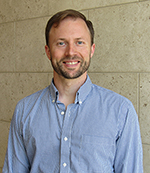Unlocking the future: A Big Data analysis of spectrum reallocation from broadcast to broadband Argyros School Spotlight
June 13, 2017

Dr. Abel Winn
Every time you use your smartphone to send a text, download an app or check social media you are sending and receiving data. That data travels along the electromagnetic spectrum, a shorthand term for all the various frequencies and wavelengths at which energy can travel. We can think of the electromagnetic spectrum as an interstate highway, and a bundle of its frequencies as a lane on that highway that transports bits of information, rather than automobiles.
Lots of those lanes of spectrum facilitate technologies like terrestrial radio and broadcast television. With the rise of mobile computing, there is a pressing need to open more lanes for broadband internet connection, but unlike a physical highway we can’t add new lanes to the electromagnetic spectrum. We can only reallocate the lanes we already have. To facilitate this reallocation the Federal Communications Commission (FCC) has designed an auction process for television stations to sell spectrum rights and mobile broadband carriers to buy them.
Unfortunately the FCC’s auction process has some shortcomings. The details are complex, but basically it is easy for bidders to get locked into buying more spectrum than their available funds. The risk of lock-in may keep bidders from bidding aggressively, which could cost the FCC revenue and, even worse, keep spectrum tied up in inefficient uses.
Two Chapman faculty members, Abel Winn at the Argyros School and David Porter at the Economic Science Institute, are leading a team of researchers to make improvements to the FCC’s auction rules. These researchers will simulate hundreds of thousands of spectrum auctions using computerized bidders to work out the conditions under which the FCC’s process fails to allocate spectrum effectively. They will then test alternative bidding rules under those conditions in laboratory experiments where human bidders compete with real cash. The results of these experiments can then be used to help policymakers design more effective spectrum auctions in the future.
Dr. Abel Winn is an assistant professor of managerial economics in the Argyros School of Business and Economics at Chapman University. His research interests include economic systems design and experimental economics.


